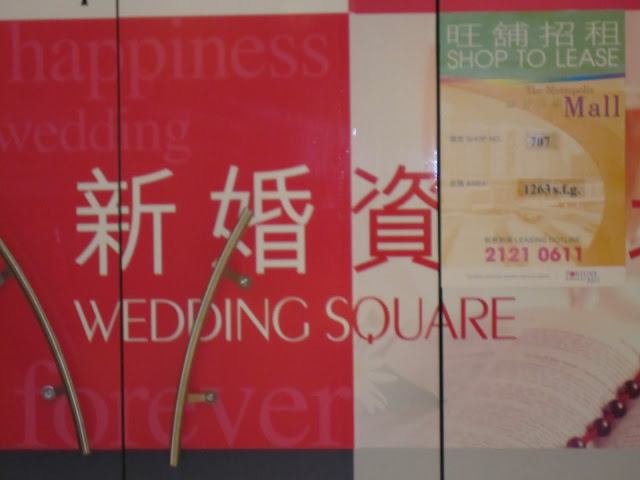We live next to the wedding mall in our harbor hotel. Yes, that’s right, a mall full of everything weddings. Wedding services, wedding makeup, wedding flowers, wedding decorations, wedding planners, and restaurants that shut down their public dim sum service to become wedding banquet halls. I’m told that our mall is only second best in Hong Kong. The Golden Plaza in Mong Kok district holds the prize for that—boasting more than 100 wedding shops. Our mall is home to a variety of other stores and restaurants (thankfully).
Weddings are a big deal in Hong Kong, much as they are most places in the world. The bride frequently dresses in a traditional red Chinese gown (red for good luck) adorned with gold and silver as well as in a Western white dress. Gowns can be rented or purchased from the stores that offer a range of wedding services.
This blog isn’t going to be the insider’s guide to a Hong Kong wedding. I’m no expert on that. I’ve never even attended a wedding here. Instead these are just my observations and photos of weddings I have observed at a distance—and the shops I pass every day on my way to and from the train station. So this will just be a voyeur’s guide to the wedding experience.
Mall Wedding Protocol
One of the first things we noticed about the wedding banquet hall in the mall was the TV screen outside that carried the names of the happy-couple-du jour alongside a photo taken long before the event. Must be that it is not considered bad luck to see the bride in her dress, as photos are taken in picturesque spots all over the city prior to the big day—in parks, along the harbor, etc. Luck is a major part of the event, though, so fortune tellers can get involved in picking the most auspicious day on which to hold the wedding.
Getting back to the banquet hall description, we have passed the place many times when a wedding was being held. A guest registry is set up at the highly decorated entrance to the restaurant. Inside tables are covered with cream-colored shiny material that matches the chair covers. At one end of the room, there is a stage for the bride and groom –elevated for a better view by the guests. And if they can’t be seen well by those sitting far from the stage, a large television screen will capture their movements. We also notice that the TV screen outside the restaurant always lists the couple’s first names—their English first names, not their Chinese names given to them at birth. Perhaps this wedding mall is just for the Western weddings, as we’ve never seen anyone’s picture in the traditional red dress.
High Cost of Getting Hitched
Much cost is incurred by the weddings, even in the economic hard times. A local paper in August announced that the wedding halls in the entire region were fully booked from that time until October 2010! And the most popular places were the five star hotels, not the less pricey 3 star ones. A survey reports that the average price spent on these occasions was $30,000 (U.S.) in 2009—down from $31,225 in 2008. Weddings must be resistant to economic change here. The total spent in Hong Kong in 2008 was reported to be $1.5 billion (U.S.).
To avoid the big expense, or just to get married in a more exotic location, many couples choose another country in Southeast Asia for the ceremony. I enclose a picture here of newlyweds in Siem Reap who went to visit Angkor Wat to be photographed. Our driver told us that couples wait until the end of the rainy season to get married there. That had just happened when we arrived.
In Memoriam
While I’m on the subject of weddings, I want to take the time to remember my good friend Beth Wood. It wasn’t so very long ago that I attended her wedding to my friend and colleague, Dan Drew, in the faculty club of the Indiana Memorial Union. I'm sure it was the happiest day of their lives. They seemed to be perfect for each other. She, so full of life and enthusiasm for most everything. He, the practical joker and always ready with a good story. Both of them, really good people. We had many good times together—even after the cancer appeared in her lung. She smiled through it all—the surgery and the aftermath. And she had several really good years before the return of the disease. It claimed her life in the last week, but never her spirit. I can scarcely believe that we won’t ever be able to have lunch at the Limestone Grill or Tallent again. I will miss the twinkle in her eye and her excitement for life. She boosted my spirits on many occasions and taught me to value every precious moment we have left to us. I raise my glass to you Beth and thank you for being my friend.











